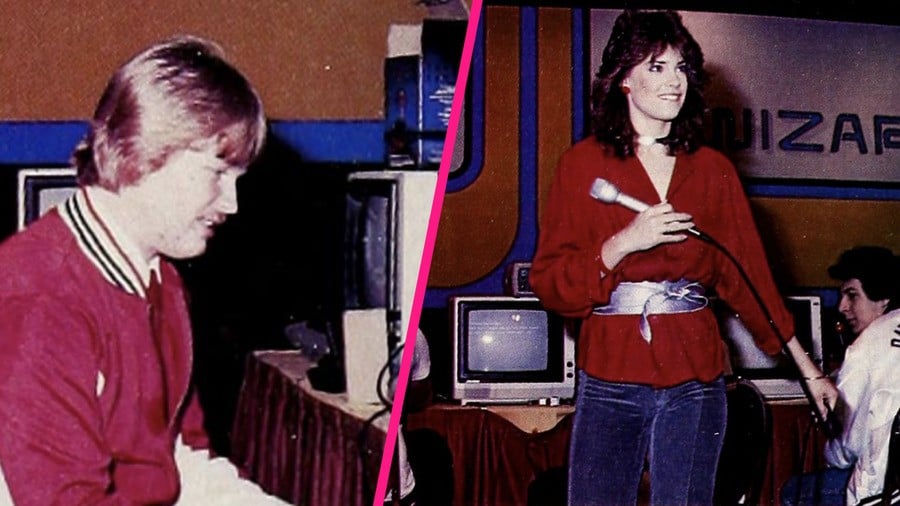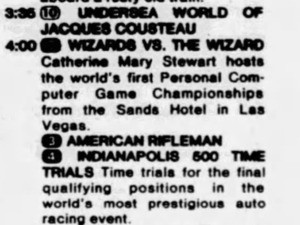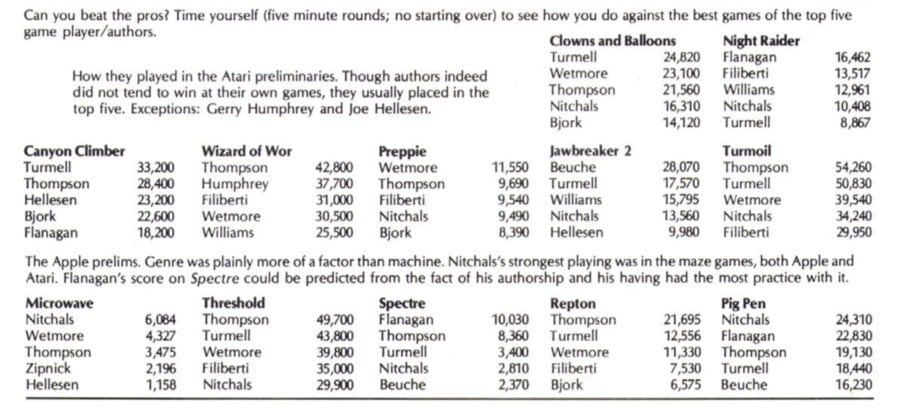
While it's tempting to think of eSports as a fairly modern creation, there were actually competitions as early as the 1970s and 80s that sought to combine the popularity of video games with the thrill of a live tournament.
Some of you, for instance, may already be aware of Stanford University's Intergalactic SpaceWar Olympics from October 1972 — which is widely believed to be the first-ever gaming tournament of its kind — or Atari's nationwide Space Invaders competition from 1980, which saw a young Rebecca Heineman being crowned the champion. These competitions have been discussed pretty regularly in the past both in articles and videos, ensuring that there is at least some online record of them ever having taken place.
However, there's one other tournament that seems to be far less well-documented and by no means less interesting — one we only recently began digging into thanks to the following tweet from the Sierra On-Line co-founder Ken Williams (who was one of the 12 participants chosen to take part):
Wizard Vs. Wizards is an event that took place on December 3rd, 1982, at the Sands Hotel & Casino in Las Vegas and saw a bunch of game developers come together to play each other's games on Apple & Atari computers to compete for a prize worth $10,000-$20,000 (the amount differs depending on the source).
It was covered in the New York Times, Softline, Softalk, and Steven Levy's book Hackers: Heroes of the Computer Revolution — it was even filmed for Television and shown the following year as evidenced by some TV listings we were able to dig up — but ultimately it seems to have been forgotten about in the decades since (the only other article we could find on it was this piece from 2015 from The Golden Age Arcade Historian).
The event was organized by the Software Distributors (a third-party distributor between manufacturers and retailers) and a television producer named Tom Tatum — a figure that Levy describes in Hackers as "a former lobbyist, lawyer, and Carter campaign aide, now a leading purveyor of video 'docu-sports' programming". Tatum had previously produced shows like the 1981 Maui Windsurfing Grand Prix, the Telluride Aerobatics Invitational, and the Miller High Life Super Cross Finals, but felt that computer games had the potential to attract a much wider audience. His reasoning, according to Levy, was that "only a small percentage of the population will own a Super Cross bike… But when you look at people computing at home, it’s awesome."

Tatum had high hopes for the show, calling his idea "the event where Hollywood meets the Computer Age" and "The ultra contest of the eighties". He even labelled the game developers as "the new stars" with these participants including Datasoft's Steve Bjork and Gerry Humphrey, Sierra On-Line's Ken Williams and Chuck Bueche, Roklan's Joe Hellesen, Sirius's Dan Thompson and Mark Turmell, Adventure International's Russ Wetmore, Datamost's Jay Zipnick, Peter Filiberti, and Bob Flanagan, and the freelance programmer Jim Nitchals (representing Cavalier Computers).
According to Softline, the rules for the event saw the 12 programmers entering one game each, resulting in seven Atari games and five Apple games:
- Clowns & Balloons (Datasoft, Atari 8-bit)
- Night Raiders (Datamost, Atari 8-bit)
- Canyon Climber (Datasoft, Atari 8-bit)
- Wizard of Wor (Roklan, Atari 8-bit)
- Preppie! (Adventure International, Atari 8-bit)
- Jawbreaker 2 (Sierra On-Line, Atari 8-bit)
- Turmoil (Sirius, Atari 8-bit)
- Microwave (Cavalier Computers, Apple II)
- Threshold (Sierra On-Line, Apple II)
- Spectre (Datamost, Apple II)
- Repton (Sirius, Apple II)
- Pig Pen (Datamost, Apple II)
In the preliminaries, competitors would play each game for a total of five minutes with the four top players then going on to play four selected Apple games in the semi-finals. The two survivors would then switch back to Atari for the final round, playing three games selected at random by the scorekeeper DEC Rainbow, with the best two out of three winning the tournament and taking home the prize.
It was an interesting concept, but, as various sources claim, not everything went according to plan in the run-up to the event — or indeed the day of. The event, for instance, was originally supposed to be sponsored by Atari, but just a few days before the event, Atari pulled out, leading the organizers to scramble to buy several Atari 800 machines from local retailers. Eventually, Apple stepped in to provide a dozen or so of its own computers, leading the event to become more "bipartisan" than originally planned.

Besides Atari pulling support, other problems also included a "joystick controversy" in the preliminaries, forcing the competitors to switch to Wico Command Controllers from Atari sticks, as well as some issues with the Days of Our Lives actress Catherine Mary Stewart who had been hired to host the event and kept messing up her lines.
Reflecting on this, Williams said on Twitter, "She had a really tough time trying to make us interesting. I think she knew the show was a disaster. She kept flubbing lines and started crying at one point. She was probably thinking, 'Why am I here?' I'm sure this was an event she wishes she could forget."
Despite the aforementioned issues, the show continued as planned, with Jim Nitchals, Dan Thompson, Mark Turmell, and Russ Wetmore facing off in the semi-finals, before Nitchals and Thompson squared off again in the finals. The result of the show was meant to be kept a secret, with it slated to be broadcast at a later date, but Nitchals ended up blowing his shot in the final three games, paving the way for Thompson to come out on top.
What's fascinating about Wizard Vs. Wizards is that it was actually intended to be more than just one event, with the title even being a reference to these plans. How Tatum envisioned the competition continuing was that the winner of last year's tournament would return for the following tournament, defending his title against a new group of "Wizards", but it seems the competition was never repeated.
From what we were able to find out, the TV Show aired one year later in May 1983, with a similar show called Starcade beating Wizard VS. Wizards to air. It doesn't seem to have caused all that much of a splash, and no footage of the tournament seemingly remains. We live in hope, however, that one day someone may find an old VHS in useable condition and salvage its contents.
